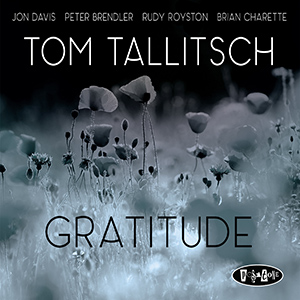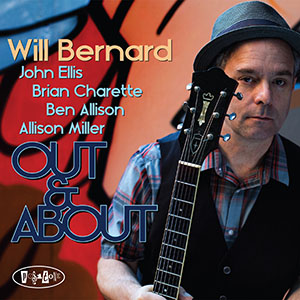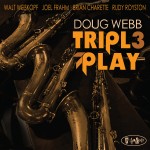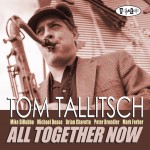 From the opening seconds of the first track “Terrain”, it’s easy to understand why the new Tom Tallitsch CD, titled “Gratitude” (his 4th for PosiTone Records), is so enjoyable. The music sounds like vintage John Coltrane, circa 1957, powerful yet accessible and played by a band that is on fire. The tenor saxophonist surrounds himself with such great players including pianist Jon Davis, bassist Peter Brendler, and drummer Rudy Royston (organist Brian Charette shows up on 2 of the 11 cuts). My affection for the amazing work of Mr. Royston is no secret and the bassist, one of the more melodic and focussed musicians, is very impressive. Davis, who worked with bassist and composer Jaco Pastorius, is a two-fisted delight, supportive and adventurous.
From the opening seconds of the first track “Terrain”, it’s easy to understand why the new Tom Tallitsch CD, titled “Gratitude” (his 4th for PosiTone Records), is so enjoyable. The music sounds like vintage John Coltrane, circa 1957, powerful yet accessible and played by a band that is on fire. The tenor saxophonist surrounds himself with such great players including pianist Jon Davis, bassist Peter Brendler, and drummer Rudy Royston (organist Brian Charette shows up on 2 of the 11 cuts). My affection for the amazing work of Mr. Royston is no secret and the bassist, one of the more melodic and focussed musicians, is very impressive. Davis, who worked with bassist and composer Jaco Pastorius, is a two-fisted delight, supportive and adventurous.
Tallitsch provides his band with a number of strong vehicles, not only for his rich, blues-drenched, sax but also making sure to give everyone a chance to shine. Listen to how Brendler and Royston drive “Refuge“, their acceleration pulling the sax and pain with them. As is his won’t, the leader does not overplay. He tends to caress melodies instead of roaring through. The group’s take on John Lennon’s “Because” starts slowly and sweetly, building during the saxophone solo and hitting its stride during Davis’s strong solo. The bass counterpoint is also quite nice. Charrette shows up on the other 2 “covers”, “Gold Dust Woman” (by Stevie Nicks) and “Thank You“, one of the few slow tunes on “Led Zeppelin II” (composed by Robert Plant and Jimmy Page). The folky quality of the original version can be felt on the latter track; with the addition of the organ, one hears the influence of The Band. The tenor solo near the close of the tune hews closely to the melody and one can hear the gratitude from the lyrics.
Several of the cuts are really barn-burners. Beside the CD opener, “Alternate Side” fires on all cylinders without overheating. Tallitsch really digs into his solo, romping atop the active cymbal work and the fast-paced “walking” bass lines. A big dollop of funk is the basis for “Rust Belt” – Brendler’s thick foundation and Royston’s snappy snare work set the tone with the leader and pianist playing with great delight. Turn it up and watch the speakers shake. More of that Coltrane/McCoy Tyner power enlivens “Oblivion“, the tension created by the rhythm section is thick but enjoyable.
The soulful sounds of the title track serve as a good reminder that the best music is about melody, rhythm, intelligent interplay, and emotion. Jon Davis’s splendid solo on “Gratitude” has so much soul as does the excellent bass work of Peter Brendler; when Tom Tallitsch enters, he plays with such ecstasy goosed on by the impeccable playing of Rudy Royston. This music sounds so good – engineer Nick O’Toole has such a knack for capturing rhythm sections while not ignoring the front line – and it feels quite good as well. With “Gratitude“, Tom Tallitsch has, arguably, created the best recording of his career. Keep them coming!
 For his 8th album as a leader (and 2nd for PosiTone Records), guitarist and composer Will Bernard went into the studio with a crackling rhythm section (drummer Allison Miller and bassist Ben Allison), organist Brian Charette, and saxophonist John Ellis. While Bernard is often found in situations where he is called on to be “funky”, his PosiTone recordings have given him the space to expand.
For his 8th album as a leader (and 2nd for PosiTone Records), guitarist and composer Will Bernard went into the studio with a crackling rhythm section (drummer Allison Miller and bassist Ben Allison), organist Brian Charette, and saxophonist John Ellis. While Bernard is often found in situations where he is called on to be “funky”, his PosiTone recordings have given him the space to expand.
![Joe Magnarelli, trumpet – Three on Two [TrackList follows] – Posi-Tone Joe Magnarelli, trumpet – Three on Two [TrackList follows] – Posi-Tone](http://audaud.com/wp/wp-content/uploads/2015/08/JoeMags.jpg)

